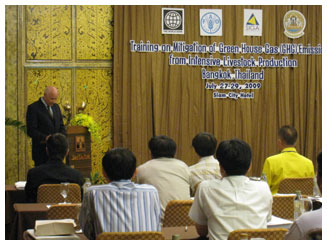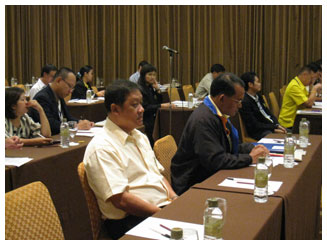|
Taking note the growing importance of intensive animal production
systems in the region, including in Thailand, as well as realizing the
growing need to curb the gaseous emissions of the sector, FAO in
collaboration with the Sasin Institute for Global Affairs, Sasin
Institute of Business Administration of Chulalongkorn University (SIGA)
conducted the training on the mitigation of greenhouse gas emissions
from intensive production in Thailand during 27-29 July 2009 in
Bangkok, Thailand.
 

The training focused on the mitigation of greenhouse gas emissions
from these sources. It addressed both the technical and policy aspects
- as well as the nexus between the two - of the livestock production
and climate change. Key questions of the greenhouse gas emissions of
the livestock sector, as well as the relevant technical options
available, were actively discussed throughout the course of the
training.
 
One day field trip was arranged on 28 July for participants to visit
Kachanaburi Farm in Suphanburi province. Kanchanaburi farm is an
integrated farm with 20,000 pig heads. The farm adopts good farming
practices, and environmental and energy saving measures. The farm has a
covered lagoon with the generator used for generating the electricity.
This helps save 40% of its electricity cost.
The Training was attended by 36 participants from the Department of
Livestock Development, academic institutions, private sectors, as well
as international organizations.

Please click here
for more information and presentations from the training. |